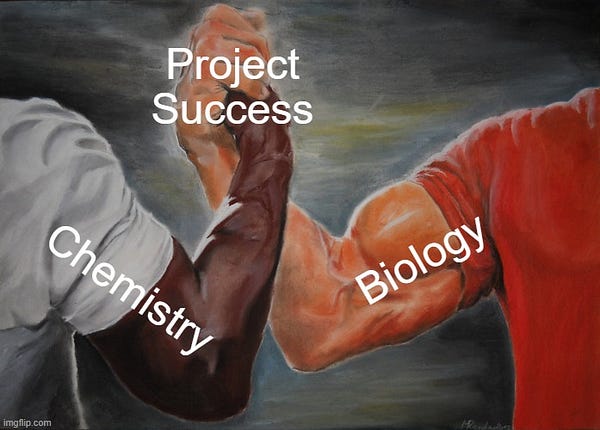End of year Substack post catch-up train rolls on. Here I’ve combined the summer months into a single post. As many of my followers may know, I took a well-deserved six week sabbatical from work this summer. And going along with that, I also took a six week hiatus from posting on Twitter. With that big of a gap, it made sense to roll up everything else from this summer into a one post.
Incidentally, for those who are interested, I’ll publish a separate post on what exactly I did on my sabbatical. It’ll be completely off-topic relative to what I usually post around here, but many folks have asked and I’m inclined to oblige. Stay tuned!
Without further ado, here’s the best of the rest of Summer 2022…
The photo of the summer is from my hike up Cathedral Rock in Sedona, AZ with my youngest son in late July.
This is indeed the Epic Handshake of drug discovery.


Writ large, this is why medicinal chemistry can be such a taxing line of work. For every “rule” (Rule of 5, carboxylic acids don’t have good cell permeability, phenols are highly metabolized, etc.) that someone tries to carve in stone, somewhere out there is a medicinal chemist who will delight in breaking that rule for fun and profit. It sometimes leaves you with the feeling that the entire foundation is shifting sand and that there are no ground truths. But I think this swings the pendulum too far in the other direction. A lot of it is down to the semantics of calling these things “rules” when they’re best referred to as “guidelines” instead. Guidelines can be useful for increasing the odds of success, but also leave a bit more psychological space to go outside them and take calculated risks when it makes sense to do so. There’s no substitute for a good hypothesis and then testing it. Data trumps every “rule”.

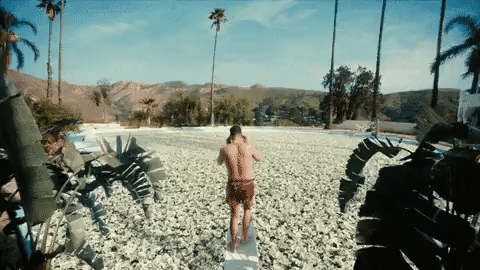

I’m not quite as scorched earth on ACS as some quarters of ChemTwitter are, but it sure seems to me like they should be better stewards of our money. C&EN is probably the best benefit of the organization, and ACS managed to piss off the entire staff there this year with organizational changes.
DALL-E was the beginning of the AI march this year. It had its moment I suppose. What it came up with for TPD as an abstract concept though was underwhelming. Maybe I should have asked it for a cat picture instead.


Only funny because it’s true, in both directions. The larger issue here is that we’d all do well to spend a little more time thinking about things from the perspective of our peers and colleagues. Call me an optimist, but experience has taught me that most scientists I’ve worked with in pharma have good intentions. If it’s not coming off that way to you, maybe first consider what you’re not grasping about their perspective before going on the offensive.

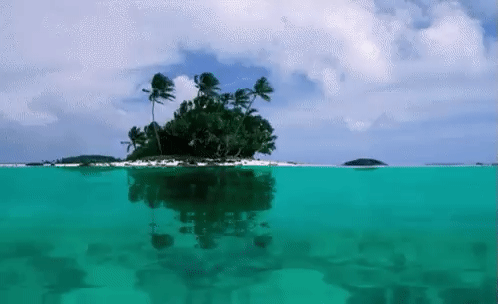
It can take time to unwind the “island mentality” at the beginning of your industrial career. Often earning a PhD can be a lonely experience. A big part of the process is learning how to learn, to research, independently. Sometimes that gets taken to an extreme. In my own PhD program, I had “my” total synthesis that I worked on largely alone, adding another student to help with part of it for the last ~18 months or so. This is the polar opposite of the team-driven environment of the pharmaceutical industry. I see lots of folks come in riding their Dunning-Kruger high and thinking they’re gonna be a lone gunslinger. They all get their slice of humble pie eventually.





More hiking on the Metacomet Ridge. This is just a bit to the east of Giuffrida Park, where the photo of the month at the top of the post was taken.


Academia has a real and growing problem with their pay scale for grad students and post-docs. As I’m writing this, the entire UC system is having a strike for better graduate student pay. I suspect it will ultimately lead to less students coming through the academic pipeline with greater pay. Regardless, if you’re tired of mortgaging your future financial security and quality of life in exchange for intangibles like “noble calling” — we’re hiring in pharma, and we pay well.



Somewhere out there, there must be a billionaire willing to part ways with some of their fortune to improve human health. And Bob and I are here to make sure that money gets dispensed wisely. (For a nominal fee, of course.)




These two posts go together. Robust target validation in a way that convinces a company to invest millions (possibly billions) of dollars in a drug discovery effort around that target is hard. We take literature identification of new targets for human disease as an initial validation exercise that we’ll always follow up with our own studies and analysis. The number of times that initial validation doesn’t check out in robust validation is… high.

It is. Employees can and will be reduced to a knowledge commodity in a M&A situation. I’ve lived it. Rather than rail against that too much though, the wiser course is probably to accept that reality and future-proof your career. Knowing this is what will happen, you can be prepared to transition to the next thing when it does — rather than be caught off-guard. Active management of your career is 100% on you.

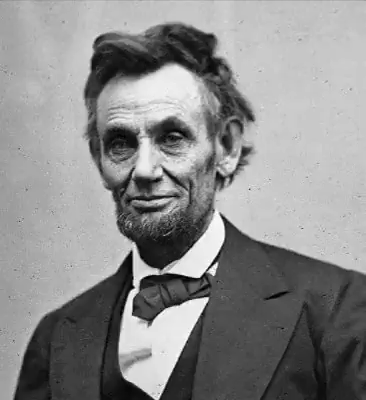
A fun (?) story about milk sickness that I picked up while on sabbatical. I have a bunch more of these teed up, but haven’t found as much time as I’d like to get them all written up.


See previous comments about ACS. No? Try to find a per-seat or site license pricing scheme for SciFinder anywhere on their website. I’ll wait. (Not really, though.)

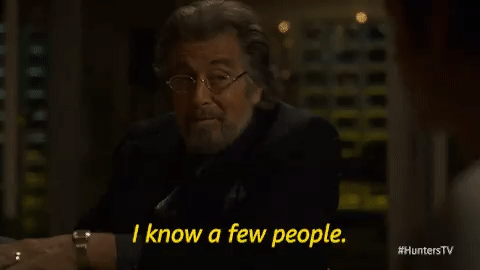
At risk of sounding like a broken record: drug discovery is a hard business. You have to marshal your forces for a battle that’s got a 95% chance of long-term failure. Eventually, you’re going to have to ask someone to die on a hill for you, and you want to make damn sure they say yes. There should be time in your schedule every week (seriously! plan for this) for relationship building. And don’t forget to do simple things like say thank you! Scientists are notorious at taking great performance for granted and heaping criticism on minor deficiencies. That’s not how you motivate people.

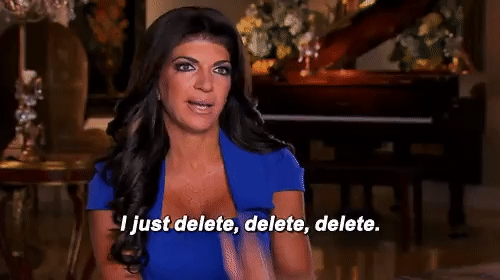
My email management skills have leveled way up in the second half of this year. Time away afforded a perspective I was missing.

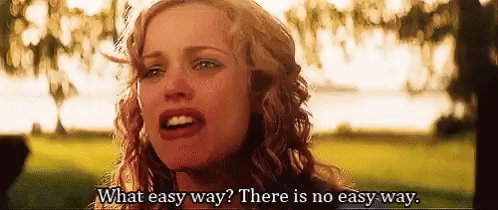
No panaceas. This got encoded in the “drug discovery axiom” series later in the year.


Go to Yellowstone, seriously. Every scientist who has the means should make this pilgrimage at least once in their lives. I’m lucky to have been there twice, and seeing the geothermal (and biological!) magic never gets old.


If there’s a conversation I’d like to bend the direction of on Twitter, it’s this one about “leaving” academia. The implied sense of failure in that phrase, and the further implication that academia is somehow the peak career for scientists, needs a complete rethink. I know why people say it — but I can’t help but feel that everyone who says it has been tidally locked into a distorted view of reality orbiting around academia. In fairness, it’s far, far more of a problem in other fields than it is in chemistry. But it still hurts my heart to see it. Things can be really good in industry, and I’d like to see a lot more people moving with positive intent toward non-academic careers vs. carry the language of “leaving” along with their decision.


Never forget the free drug hypothesis!

The Friday pharmacology pop quiz series has been a lot of fun, and a gut check on whether or not the tweetorials have been having an impact. Sadly most of them confirm that I still have work to do.


The short-cutters will not succeed at drug discovery without a miracle.

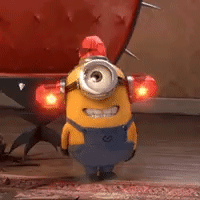
One thing I’ve learned to do over the years is to soften my language, especially when pontificating about broad topics. 20+ years of not seeing many absolutes in drug discovery does that to a guy.

In my own line of work, remember when the doomsayers said that PROTACs would never be orally bioavailable? Welp.


This was peak Bad Twitter for me. The number of folks out there who feel comfortable dehumanizing other human beings from the comfort of their living rooms and safety/anonymity of their keyboards is a bit scary. If you wouldn’t say it to them in real life, don’t say it here either. And if you would say some of these things in real life, maybe evaluate whether or not you’re an asshole.


I’d settle for easier conversion of references to different formats. I don’t write enough papers though to make it worth my while investing in EndNote or the like. I do use ReadCube to read papers though… very handy.


That’s a Painkiller in my plastic cup. Thank you, I will not be taking questions.


This led later to a longer post on career self-reflection. The bottom line is that you have to take control of your career instead of waiting for things to happen. If you become a bystander, you’re inevitably going to feel like a victim when something bad happens. There’s so much agency to claim here and I want to help people find theirs!


I loathe the word “importantly” in scientific manuscripts. All adverbs should go, but most of all “importantly”. Because the “in our not-so-humble opinion” afterward is usually silent. I don’t want to see this word in the literature ever again. It’s lazy at best, condescending at worst.


I just gave a talk in October. Still true after 20 years of public speaking.






